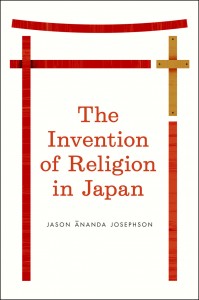 In the book The Invention of Religion in Japan, Jason Ananda Josephson traces the roots and history of religion in Japan. Josephson writes about the political motivations and consequences of Japan’s religious space:
In the book The Invention of Religion in Japan, Jason Ananda Josephson traces the roots and history of religion in Japan. Josephson writes about the political motivations and consequences of Japan’s religious space:
More than a tale of oppression or hegemony, Josephson’s account demonstrates that the process of articulating religion offered the Japanese state a valuable opportunity. In addition to carving out space for belief in Christianity and certain forms of Buddhism, Japanese officials excluded Shinto from the category. Instead, they enshrined it as a national ideology while relegating the popular practices of indigenous shamans and female mediums to the category of “superstitions”—and thus beyond the sphere of tolerance. Josephson argues that the invention of religion in Japan was a politically charged, boundary-drawing exercise that not only extensively reclassified the inherited materials of Buddhism, Confucianism, and Shinto to lasting effect, but also reshaped, in subtle but significant ways, our own formulation of the concept of religion today.
To read more about the book, please click here.













Looks very interesting. But the more radical part of the book’s would seem to be the earlier paragraph of the back cover blurb:
“Throughout its long history, Japan had no concept of what we call ‘religion.’ There was no corresponding Japanese word, nor anything close to its meaning. But when American warships appeared off the coast of Japan in 1853 and forced the Japanese government to sign treaties demanding, among other things, freedom of religion, the country had to contend with this Western idea. In this book, Jason Ānanda Josephson reveals how Japanese officials invented religion in Japan and traces the sweeping intellectual, legal, and cultural changes that followed.”
It is an honor to be featured here. Thank you!
If anyone has comments or questions about the book or my other research, please post a comment on this thread and I’ll do my best to answer them.
Also readers of the blog who live in the greater Boston area might want to know that I’m giving a talk at the Harvard Bookstore on Friday September 27: http://www.harvard.com/event/jason_josephson/.
Jason Ānanda Josephson’s book is a new classic. I spoke with Josephson at length about this wonderful book for New Books in Religion. You can listen to our conversation here:
http://newbooksinreligion.com/2012/10/13/jason-ananda-josephson-the-invention-of-religion-in-japan-university-of-chicago-press-2012/
Just a quick note that readers of The Immanent Frame might want to know that “The Invention of Religion in Japan” has won a major book prize—“The Society for the Scientific Study of Religion: 2013 Distinguished Book Award.” I’m honored that my book has achieved this kind of recognition and from such an august academic society. A million thanks are due to my wonderful friends and colleagues whose suggestions and critical comments helped make it a better work.